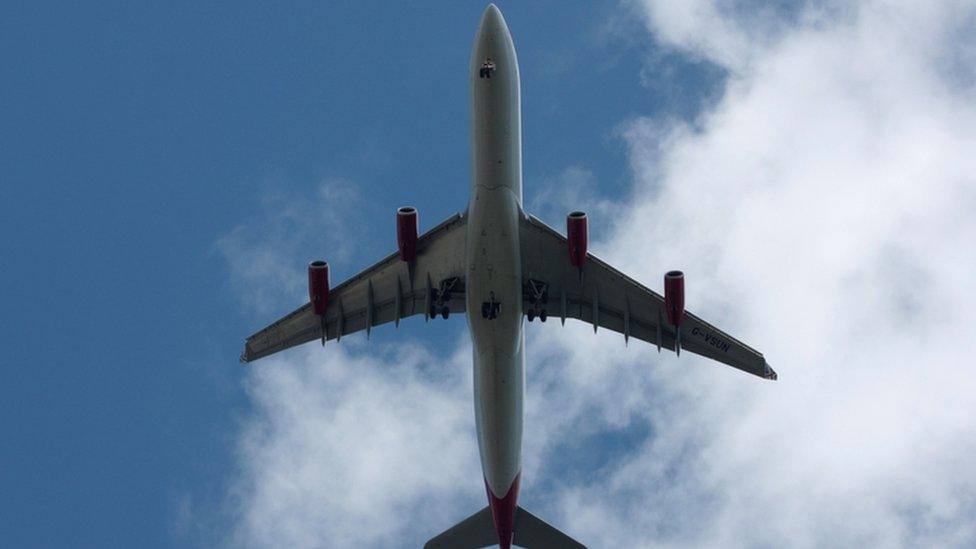MSPs approve air passenger tax changes
- Published

Holyrood has voted to replace the tax paid by passengers on flights from Scotland's airports.
MSPs voted by 108 to 11 to replace Air Passenger Duty (APD) with a new devolved Air Departure Tax (ADT) in Scotland from April next year.
But the rate at which is the tax is set is likely to be more controversial when it is decided later this year.
The Scottish government wants to cut the new tax by 50%, before eventually scrapping it completely.
It argues the move will boost the economy by increasing the number of flights to and from the country.
Opponents are concerned about the environmental impact of more flights, and claim the cut would mainly benefit wealthy travellers and big business.
The Scottish Conservatives and Labour joined the SNP in voting to pass the Air Departure Tax Bill, with the Scottish Green and Liberal Democrats voting against.

What is Air Passenger Duty?

Air passenger duty is charged on all passenger flights from UK airports
The rate of tax varies according to where the passenger is going, and the class of travel
It was introduced in 1994, and was originally just £5 per person for short-haul flights, and £10 elsewhere
The tax has been increased by successive UK governments, and brings in about £3bn a year
From 1 April this year, flights of 2,000 miles or less saw APD charged at £13 for passengers in economy class seats, and £26 for all other classes
For flights of more than 2,000 miles, the rate is £75 for economy class, and £150 for any other class
No APD is charged for direct long-haul flights from Northern Ireland, or for flights from airports in the Scottish Highlands and Islands
Children under 16 are also exempt from paying APD on economy flights

The Greens subsequently warned that the party's six MSPs may not deal with ministers when it comes to budget talks next year unless there is rethink on plans to cut the current charges.
The minority SNP administration relied on votes from the Greens to pass its Budget for the current financial year.
But Green MSP Andy Wightman said his party could not support legislation with "such weak environmental, economic and social criteria".
The Greens published research over the weekend that suggested cutting APD was "predominantly a tax giveaway for Scotland's wealthiest households and corporations".
Tackling climate change
Labour said it had only backed the bill as it would not have been possible to levy any air departure tax at all if the legislation had not been passed.
But the party's transport spokesman, Neil Bibby, said Labour would strongly oppose any future plans to half the tax, which it said would take £189m out of the Scottish government's budget while mainly benefiting wealthier travellers.
The Liberal Democrats said cutting APD would be "reckless" and accused the Scottish government of pandering to the aviation industry at the expense of tackling climate change.
But the Scottish Conservatives have backed the abolition of air tax on long-haul flights, although they want to keep it for short-haul passengers.
The Scottish government says its plans to reduce the tax are a "fundamental component to improving Scotland's international connectivity and providing a real boost to our economy".
'New routes'
Finance Secretary Derek Mackay said: "Our airports are competing on a world stage to secure new routes and capacity.
"Reducing the tax burden helps ensure a more level playing field with many other European airports competing to secure the same airlines and similar routes.
"New routes will enhance business connectivity and tourism as well as providing new jobs."
The Scottish Parliament was given powers to charge tax on passengers leaving Scottish airports under the Scotland Act, which came into force last year.
APD currently raises about £300m in Scotland and £3bn across the UK every year.
The bands, rates and exemptions for the replacement tax are not covered in the bill and will be decided as part of the Scottish government's annual budget process, which will need the approval of a majority of MSPs.
A report commissioned by Edinburgh Airport, external said halving APD would create almost 4,000 jobs and add £1bn to the Scottish economy by 2020 - and argued that failing to act could see Scotland lose out on nearly a million passengers every year.